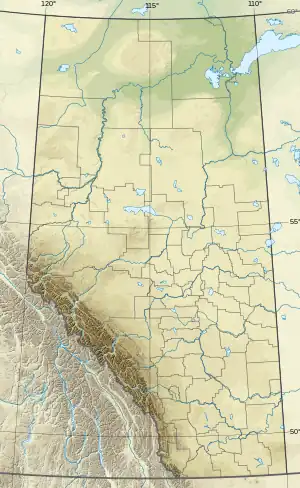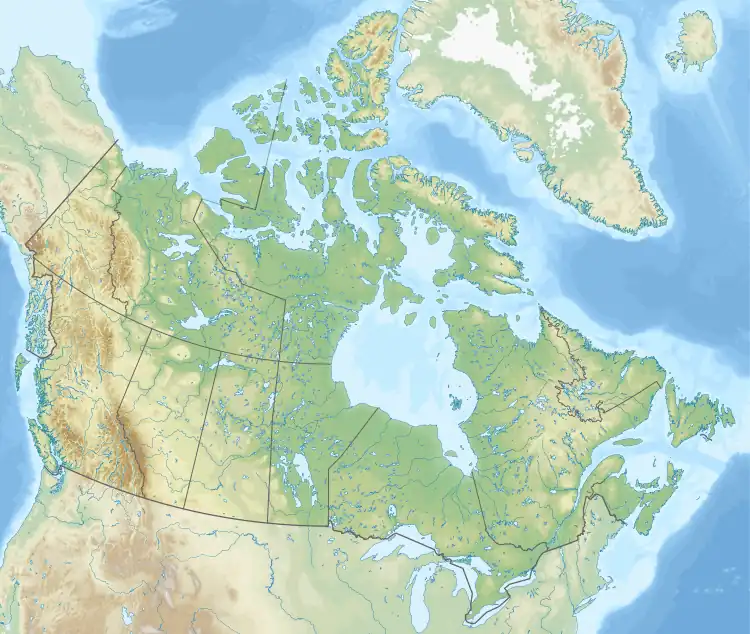Mount Allenby
Mount Allenby is a mountain summit in Alberta, Canada.[3]
| Mount Allenby | |
|---|---|
 Mount Allenby Location of Mount Allenby in Alberta  Mount Allenby Mount Allenby (Canada) | |
| Highest point | |
| Elevation | 2,995 m (9,826 ft)[1][2] |
| Prominence | 349 m (1,145 ft)[1] |
| Parent peak | Beersheba Peak (3,054 m)[1] |
| Isolation | 1.52 km (0.94 mi)[1] |
| Listing | Mountains of Alberta |
| Coordinates | 50°56′22″N 115°31′58″W[3] |
| Naming | |
| Etymology | Edmund Allenby, 1st Viscount Allenby |
| Geography | |
| Location | Banff National Park Alberta, Canada |
| Parent range | Sundance Range Canadian Rockies |
| Topo map | NTS 82J13 Mount Assiniboine[3] |
| Geology | |
| Age of rock | Cambrian |
| Mountain type | Fault block |
| Type of rock | Limestone |
Description
Mount Allenby, elevation 2,995 meters, is set within Banff National Park, four kilometers east of the Continental Divide, and is situated near the southern end of the Sundance Range which is a subset of the Canadian Rockies.[1] It is located approximately 26.4 km (16.4 mi) due south of the town of Banff, 1.9 km (1.2 mi) north-northwest of Mount Mercer, and 12 km (7.5 mi) northeast of Mount Assiniboine. Precipitation runoff from the mountain drains into Allenby and Mercer creeks which empty to the nearby Spray Lakes Reservoir via Bryant Creek. Topographic relief is significant as the summit rises 1,115 meters (3,658 feet) above Bryant Creek Valley in 2 kilometers (1.2 miles).
Etymology
Mount Allenby was named after Edmund Allenby, 1st Viscount Allenby (1861–1936), British Army field-marshal.[4] The mountain's toponym was officially adopted in 1924 by the Geographical Names Board of Canada.[3]
Geology
Mount Allenby is composed of sedimentary rock laid down during the Precambrian to Jurassic periods.[5] Formed in shallow seas, this sedimentary rock was pushed east and over the top of younger rock during the Laramide orogeny.[6]
Climate
Based on the Köppen climate classification, Mount Allenby is located in a subarctic climate zone with cold, snowy winters, and mild summers.[7] Winter temperatures can drop below −20 °C with wind chill factors below −30 °C.
See also
References
- "Mount Allenby, Peakvisor.com". Retrieved November 7, 2022.
- William Lowell Putnam, Glen W. Boles (2006), Canadian Mountain Place Names: The Rockies and Columbia Mountains, Rocky Mountain Books, ISBN 9781894765794, p. 26
- "Mount Allenby". Geographical Names Data Base. Natural Resources Canada. Retrieved 2022-11-07.
- Place-names of Alberta. Ottawa: Geographic Board of Canada. 1928. p. 11.
- Belyea, Helen R. (1960). The Story of the Mountains in Banff National Park (PDF). parkscanadahistory.com (Report). Ottawa: Geological Survey of Canada. Archived (PDF) from the original on 2015-10-02. Retrieved 2019-09-13.
- Gadd, Ben (2008). Geology of the Rocky Mountains and Columbias.
- Peel, M. C.; Finlayson, B. L.; McMahon, T. A. (2007). "Updated world map of the Köppen−Geiger climate classification". Hydrol. Earth Syst. Sci. 11: 1633–1644. ISSN 1027-5606.